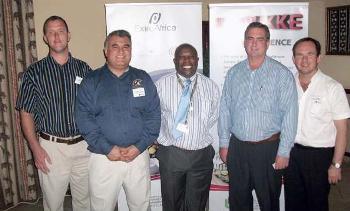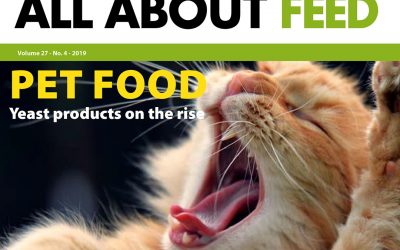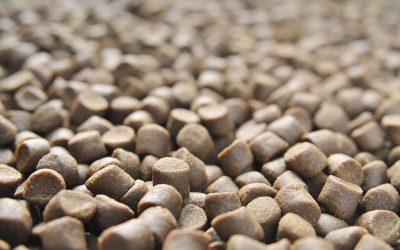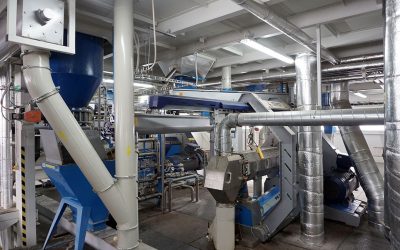ExtruAfrica shows potential of extrusion in feed production

The recently held ExtruAfrica 2011, the initiative of the North-West University’s (NWU) Centre of Excellence in Advanced Manufacturing (CoE) and the Department of Trade and Industry (DTI) to stimulate South Africa’s food and feed industries, attracted wide attention among local and African manufacturers.
The aim of ExtruAfrica was to bring together industry, academics and government, as well as an international expert to demonstrate the possibilities of extrusion. In addition, to inform local industry of the CoE’s one-stop product-, machine- and plant development services available. It has expertise available to assist clients from the conceptualisation stage of a new product, product development right through to developing a business plan, obtaining financing, extruder design and manufacturing, plant design, training of staff and locally available on-going maintenance.
Prof. LJ Grobler, head of the CoE said that in the past, extrusion, and especially twin-screw extrusion, was only available to large organisations with sufficient in-house extrusion skills. “Setting up and operating an extrusion plant requires product developers, plant operators as well as experienced maintenance staff. To operate a plant using imported technologies
without local maintenance and support posed a risk to local companies. This has been the downfall of many companies that tried to use twin-screw extrusion before.”However, the establishment of an extrusion laboratory in early 2010 enables the NWU to do product development for clients to the extent that a sample of the final product is produced before ordering an extruder. Grobler explained that they can also do small production runs to produce samples that can be used for consumer and market testing.
Why use extrusion cooking technology?
The flexibility and wide range of applications of extrusion in producing feeds, makes extrusion technology ideal for producers to add value to raw materials or otherwise wasted materials. Extrusion is a processing process used in the food, feed, plastic, powder paint and compounding industries. Grobler said that extrusion technology used as a “ready-to-eat” cooking process is particularly suitable for Africa as it is a relatively inexpensive, energy-efficient and easily an operated method to produce a wide range of animal feeds. It is also environmentally-friendly as it produces minimal waste products. Extrusion can be applied in making complete feeds for laboratory animals, aquatic feeds, bird feeds, pet foods and livestock feeds, such as poultry, swine and cattle. It can also be used in the stabilisation of oil seeds, pasteurisation and wet-waste by-products.International extrusion expert, Dr Mian Riaz from the Texas A & M University in the USA and main speaker at ExtruAfrica, shared his experience and knowledge on extrusion cooking with delegates. “Extrusion technology can be applied in different environments and can process a variety of unique products by using one machine. Hereby generally underutilised ingredients can be used before it goes to waste,” said Riaz during one of his presentations.
Defining extrusion cooking
Extrusion cooking is a continuous process by which moistened, expansile, starchy, and/or proteinaceous materials are plasticised and cooked by a combination of moisture, pressure, temperature and mechanical shear. Furthermore, extrusion cooking can be described as a tool used to introduce thermal and mechanical energy to food and feed ingredients, forcing the basic components of the ingredients, such as starch and protein, to undergo chemical and physical changes. Meanwhile forming a predetermined shape.
The functions of extruders can be listed as follows: texture alteration; thermal treatment; partial dehydration; homogenisation; protein denaturing; gelatinisation; destruction of micro-organisms and toxic compounds, grinding; hydration; expansion; shearing; mixing and shaping.Riaz provided the following advantages of extrusion cooking:
- Adaptability – The extrusion process is remarkably adaptable to accommodate the demand of consumers for new food or feed products.
- Product characteristics – A variety of shapes, texture, colour and appearances can be produced, which is not easily formed using other production methods.
- Energy-efficient – Extruders operate at relatively low moisture while cooking food products, so less re-drying is required.
- Low-cost – Extrusion has lower processing cost than other cooking and forming processes. A manufacturer can save 19% raw material, 14% labour, and 44% capital investment. Extrusion processing also need less space per unit of operation than other cooking systems.
- New foods or feeds – Extrusion can modify protein (vegetable and animal), starches (almost all sources), and other food material to produce a variety of new and unique food products.
- High productivity and automated control – An extruder provides a continuous high-throughput process and you can have fully automated controls for these extruders.
- High product quality – Since extrusion is a high temperature short time heating process, it minimises degradation of food nutrients, while improving the digestibility of proteins (by denaturing) and starches (by gelatinising). Extrusion cooking at high temperature also destroys the antinutritional compound, i.e. trypsin inhibitors, gossypol, haemaglutins, and undesirable enzymes, such as lipases, lipoxidases and micro-organisms.
- No effluent – Very little process effluent is produced which means it is an environmentally-friendly process.
Considering extruded feeds
The potential benefits of processed feed to milk cows and other livestock is tremendous. Extruded pelletted feeds offer increased bulk density, less wasted feed, improved palatability for the animal and the nutrient quality is improved. Furthermore, other benefits of using extruded feeds are: • Increased starch gelatinisation
- Ingredient flexibility
- Higher fat levels (up to 50% fat)
- Slow release of non-protein nitrogen
- Destruction of anti-nutritional factors and some bio-toxins
- Creation of non-degradable rumen proteins
- Creation of protected or bypass fat, and
- Pasteurisation
“A wide range of extruder types are available,” said Danie Vorster, manager of CFAM Technologies (Pty) Ltd, “but one would have to determine the exact use of the machine before a final decision is made. The basic categories of extruders are single- and twin-screw extruders.But the most important considerations to keep in mind when purchasing an extruder is whether local support is available from the manufacturer, a robust and dependable design, quality workmanship and materials, spare part availability and delivery time and power quality problems in South Africa. “This is why CFAM Technologies developed local extruder technology over the past 13 years to provide extrusion solutions in Africa for Africa.” Vorster added.
Future training opportunities
One-day practical seminars on extrusion are planned in different provinces in the latter half of 2011 and between February and April 2012. These seminars will be organised by the NWU, with the support of the provincial Invest-offices, the Industrial Development Corporation (IDC) and the DTI. Also, a three-day-seminar and an international conference are in the planning stages for July 2012.
Centre of Excellence The Centre of Excellence in Advanced Manufacturing (CoE) at the North-West University’s Potchefstroom Campus was established in March 2009 with the support of the DTI to align to the government’s national objectives which are: poverty alleviation, job creation, economic growth, increased manufacturing output, international competitiveness, affordable food supply and security, capacity building and development, empowerment and localisation. The CoE’s main objective is to render services to the manufacturing industry in South Africa to be able to become more competitive locally as well as internationally. More information can be obtained from Prof LJ Grobler of the CoE. (LJ.Grobler@nwu.ac.za) or visit www.dticoe.co.za or www.extruafrica.org.za. |












